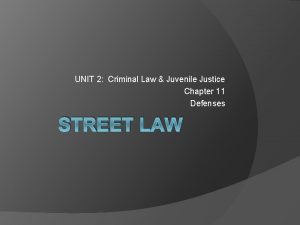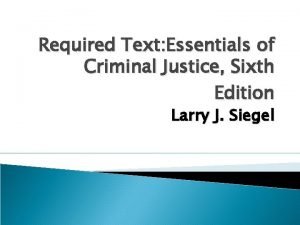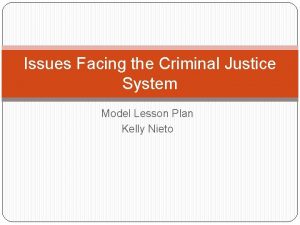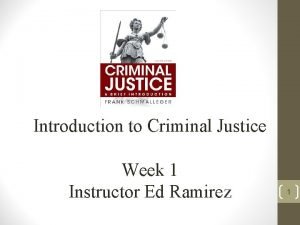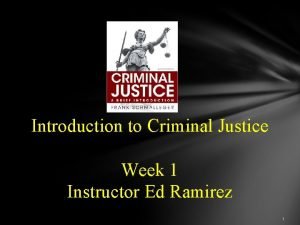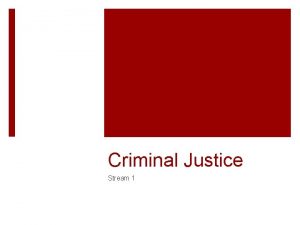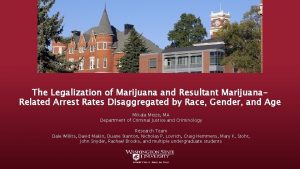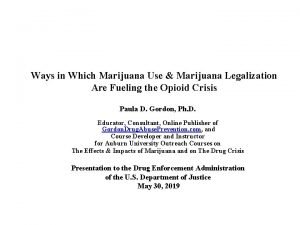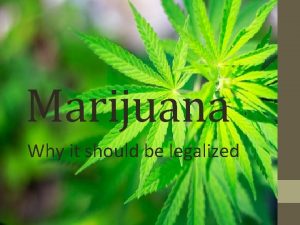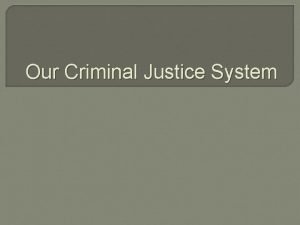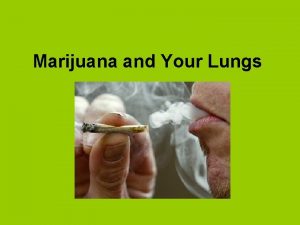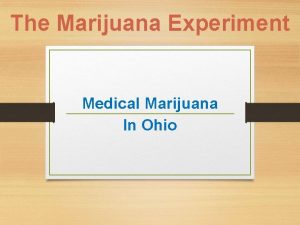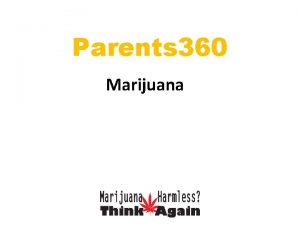The Criminal Justice Evolution of Marijuana Legalization and











- Slides: 11

The Criminal Justice Evolution of Marijuana Legalization and the CO Parental Rights Fight. Art Way Senior Director Drug Policy Alliance away@drugpolicy. org November 22, 2013 Implementation of Marijuana Reform in Colorado 1

Legalization as a Broad CJ Reform as Opposed to “The Wonders of Weed. ” • Prop 19’s Legacy: Proposition 19 phenomenon is the unprecedented coalition it forged. Longtime drug policy reformers were joined for the first time by mainstream civil rights groups, organized labor and the largest contingent of dissident law enforcement figures ever publicly assembled on this issue. • CO and WA looked to message on legalization as a criminal (system) justice reform: – “Initiative 502 is not pro-pot. Rather, it’s anti-prohibition. ” – “Its not about championing marijuana. It's about removing the substance from the toolkit of those who use its prohibition to demonize and criminalize certain segments of society when its convenient to do so. ” November 22, 2013 Implementation of Marijuana Reform in Colorado 2

Legalization as Broad CJ Reform (Cont) • Drug policy reformers champion the criminal system results: – In Colorado, the total number of marijuana arrests decreased by 46 percent between 2012 and 2014, from 12, 894 to 7, 004. The number of court filings declined 81 percent between 2012 and 2015, from 10, 340 to 1, 954, with felony marijuana filings declining by 45 percent. – The total number of low-level marijuana court filings in Washington fell by 98 percent from 6, 879 in 2011 to 120 in 2013. – In Washington, D. C. , marijuana arrests decreased 85 percent from 2014 to 2015, with possession arrests falling by 98 percent from 1, 840 in 2014 to 32 in 2015. – Marijuana charges and arrests in Alaska decreased by 59 percent between 2013 and 2015 – Marijuana arrests in Oregon declined by 50 percent from 2011 to 2014. There were 4, 223 arrests for all marijuana offenses in 2011, which dropped to 2, 109 in 2014. • We must also note the unmeasurable shift taking place concerning law enforcement culture, and marijuana legalization as an example of a reality based public health approach to drug use. November 22, 2013 Implementation of Marijuana Reform in Colorado 3

Legalization Sparks Broader Concerns • Why aren’t the new rights and decriminalization retroactive? • Will young people now face even more scrutiny from prohibitionists and police? • Is the new industry making the best of its shotgun marriage with poor, industrially located, communities of color? • Are the barriers to entry within the industry too high, only allowing for the rich and those untouched by the criminal system to play ball? • How can marijuana legalization also repair the harm to those most impacted by the drug war? • What is the best use of marijuana tax revenues? November 22, 2013 Implementation of Marijuana Reform in Colorado 4

The Current Gold Standard: Prop 64 • Prop. 64 Invests Revenue in Communities Harmed by Marijuana Prohibition – Revenue from the taxation of marijuana will be also be provided to a grant program, increasing each year up to $50 million annually, that strengthens communities disproportionately harmed by previous federal and state drug laws and policies. – Grants will support economic development, job placement, mental health treatment, legal services that address barriers to reentry, and helping community members better connect to medical care. • Prop. 64 Protects Youth in California while Reducing Criminal Penalties – Prop. 64 dedicates unprecedented funding to educate youth about the dangers of substance abuse wherever they are, particularly in schools where its explicit emphasis is preventing drop out and providing alternatives to expulsion. – Under Prop. 64, youth under the age of 18 may only be charged with infractions for marijuana offenses. All marijuana offenses will be automatically expunged from a youth’s record when they turn 18. November 22, 2013 Implementation of Marijuana Reform in Colorado 5

The Current Gold Standard (cont) • Prop. 64 Allows People Harmed By the War on Drugs to Fully Participate in the Legal Market – Under Prop. 64, a prior conviction for possession, possession for sale, manufacturing, transportation, or cultivation of any controlled substance shall not be the sole basis for the denial of a license. – Blue Ribbon Commission on Marijuana Policy chaired by the Lieutenant Governor noted, there must be opportunities for those who have operated in the illicit market to enter the legal market. • Prop. 64 Reduces Criminal Penalties and Makes Them Retroactive – Many existing misdemeanors and felonies will disappear from the books. – These sweeping reductions in criminal penalties will be retroactive—past convictions for crimes reduced or eliminated by Prop. 64 may be expunged from or reduced on a criminal record. November 22, 2013 Implementation of Marijuana Reform in Colorado 6

The Empire will Strike Back: CO’s Parental Rights Fight as an Example • 2013 Drug Endangered Child (DEC) Legislation – Attempt to define drug endangered child in criminal and civil code based on the federal CSA – Even attempted possession of an illicit substance in the known vicinity of a child or where a child is thought to reside is considered per se child abuse in both the civil and criminal code – Anytime a child tests positive at birth for schedule I or II substance except for lawful intake of schedule II (opiates) November 22, 2013 Implementation of Marijuana Reform in Colorado 7

CO Parental Rights Fight (cont) • Likely Results of Proposed DEC Legislation from 2013 -2016 – Prompt potentially baseless and traumatizing family separations with long term negative implications and collateral consequences thereby removing kids from good families without evidence of actual abuse or neglect – Unethically blur the line between social service workers and law enforcement while creating major barriers for those who use substances from accessing adequate, sensitive, and non-judgmental services – Disproportionately impact communities of color and low-income communities based on current drug-related enforcement efforts. Additionally, guidance provided on the national and local DEC website identifies poverty, mental illness, and previous incarceration as indicators for potential drug-endangerment which will prompt increased and disparate enforcement efforts within these communities – Stigmatize and isolate communities and families that display pre-existing vulnerabilities, such as the poor, mentally ill, and those struggling with drug use/misuse issues November 22, 2013 Implementation of Marijuana Reform in Colorado 8

CO Parental Rights Fight (cont) • 2017 Pro-Active Principles – Keeping families intact is the ideal way to support the best interests of children and ensure the appropriate protection of parental rights. – Potential harms of state investigations and interventions into families must be taken into consideration. – Colorado child welfare assessments of risk and safety should be consistent county-to-county and family-to-family. – Punitive approaches have been shown to disproportionately impact and further stigmatize low income families and communities of color. November 22, 2013 Implementation of Marijuana Reform in Colorado 9

CO Parental Rights Fight (cont) – Drug consumption or exposure alone is not child abuse or neglect. – Drug abuse and addiction are public health issues requiring multifaceted policy solutions to prevent and reduce harm to children, parents and families. – For parents struggling with substance abuse, recovery is possible and best facilitated with adequate time and supportive resources promoting family unity. – To target our resources efficiently and genuinely benefit families, we should prioritize allocating funds to evidence-based drug treatment, mental health care and wraparound care coordination for parents who need them. November 22, 2013 Implementation of Marijuana Reform in Colorado 10

Drug Policy based on Public Health and Safety is the Goal November 22, 2013 Implementation of Marijuana Reform in Colorado 11
 Cjpp guelph
Cjpp guelph What is corrections in criminal justice
What is corrections in criminal justice Chapter 11 basic concepts street law
Chapter 11 basic concepts street law Criminal justice wedding cake diagram
Criminal justice wedding cake diagram State of ct division of criminal justice
State of ct division of criminal justice The idea of a criminal justice nonsystem
The idea of a criminal justice nonsystem What is a grass eater in criminal justice
What is a grass eater in criminal justice Eighth amendment excessive bail
Eighth amendment excessive bail Consensus model criminal justice
Consensus model criminal justice Consensus model criminal justice
Consensus model criminal justice Four pillars of criminal justice system
Four pillars of criminal justice system Interpret
Interpret


